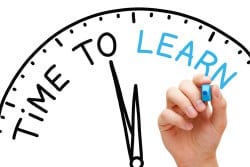
There are plenty of people that attend each conference for networking purposes and they do so because they gain clients and make money. They have the money to do travel and they use the event for deductions. They are not focused on the sessions.
However, there are a good number of people that run small businesses and they have saved up their money to attend a conference. To them the goal is to gain valuable information that they can take back and use. There has to be a return for them or they have wasted their money.
I work hard on presentations for those people that are there to learn and to take something home. And, I work hard for those that have made a sacrifice of time and money to be there. I feel like I owe them something if they attend a session of mine. This is why I try so hard.
FYI, I am not going to say how I do anything is the right way. I am just going to explain how I look at things. Additionally, most experienced speakers are aware of everything I am saying below.
Give Them Something Truly Unique
We have all seen content with the same old rehashed information. These are very rarely helpful to the majority. The same goes for presentations! No one wants to pay to hear something they have heard at other conferences or have already read a few times in articles.
They paid for something different and helpful. So while it isn’t easy, I try to check out presentations on the topic I am speaking about. I focus on avoiding common themes and work on giving away something that is personal and helpful that I feel will be helpful/useful to the members of the audience.
I feel like if I am on the list of speakers at an event, that people are paying to attend, I owe the audience – information, my time and/or answers to questions.
Preparation and Practice
As I said above, I research a lot. I have outlines, I write out entire presentations, I rewrite, I practice…then I edit and practice some more.
- I check for flow and consistency.
- I try to make sure that each topic builds on or is tied with the past topics.
- I try to avoid boredom or too much unnecessary information.
- I think about what questions might be asked and what additional information or resources I could provide.
- I try to focus on the information, not myself.
- I try to include images that will enhance the presentation and I take quality screenshots.
- I practice. Then, I practice and then I practice some more.
Over the years I have learned it isn’t about memorizing an exact script. It is about covering the topics I feel are important and adapting to the audience as much as possible. An audience of people that have partied hard the night before is much different than those that are bright-eyed and ready to go.
I Don’t Get Up and Leave
With Q&A it is sometimes hard for everyone to get to ask their question or to ask follow-ups to their first question. I always try to make sure I am available after the session to answer any questions people may have. Again, they PAID to be there and get information. Whoever is throwing the conference trusted me to be a resource for their attendees.
In my opinion, the attendees deserve my time and effort and so does the organization throwing the conference. What I want to go do doesn’t matter…the people matter.
Learning Just From the Presentation

For me personally, there is no value to presentations that have just one word on each slide (not everyone agrees with this). I like presentations that spell it all out for me for two reasons:
- I can take real notes & see what they mean as they speak.
- I can pay attention to the presenter and if I miss something look up at the screen to fill in notes.
When I am creating a presentation I want people to learn from my what I am saying and also from the presentation itself. In March I spoke at Pubcon NOLA and for the first time I created 2 presentations, one with less text for the presentation itself and a 2nd presentation for Slideshare that had everything I talked about.
This took a lot more time and effort, but again, who deserves that effort? The attendees and the conference owners.
Everyone is Different and You Can’t Please Everyone, but…
Some attendees don’t like a lot of text on slides and some do. Speakers are individuals and they all present differently. You can’t please everyone with your presentation and/or your speaking style, BUT there is one thing all speakers can do:
Make sure you are offering something unique and valuable.
Whether I like your slides or not or the way you speak or not, I will always remember the one quality piece of information that you provided. Sometimes I think speakers feel like they need to review the basics, but I much prefer the speakers that say something like ‘The basics are here…” with a Bitly link.
Suggestion: Don’t Forget People Gave Things Up to Attend
I think it is important for all speakers to remind themselves that the majority of attendees at any conference have sacrificed something to be there. They have sacrificed their time – work and family. They have spent money on conference tickets, hotel, travel, food etc. to be there.
The attendees are giving a lot and they deserve to get something back.